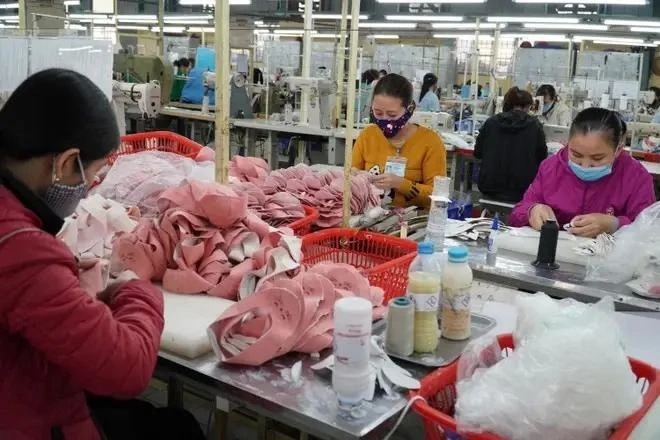Báo Bình Dương điện tử - www.baobinhduong.vn
Tổng Biên tập: LÊ MINH TÙNG
Phó Tổng Biên tập: HUỲNH MINH DÂN - NGUYỄN QUỐC LIÊM
The Ministry of Industry and Trade is considering the establishment of an international centre to create, store and trade raw materials for textile and leather footwear production in Vietnam, towards ensuring the supply chains for those sectors.

Producing footwear for export (Photo: VNA)
The Ministry of Industry and Trade is considering the establishment of an international centre to create, store and trade raw materials for textile and leather footwear production in Vietnam, towards ensuring the supply chains for those sectors.
Speaking at a meeting to discuss this issue, Deputy Minister of Industry and Trade Phan Thi Thang emphasised the importance of the two industries in Vietnam's economy, hence the need for the country to take control of the source of materials for textile and leather production.
Textiles and leather footwear have always been Vietnam’s major exports, with turnover that increases by an average of a 10% per year, according to Deputy Director of the Ministry’s Industry Department Pham Tuan Anh.
In the last six months of this year, the combined export turnover of the two industries reached nearly 30 billion USD. They account for 16% of the country’s total and create nearly five million jobs, or 22% of industrial jobs in the country.
However, their strength lies only in sub-contracting, which creates little added value to the products, Anh noted. Vietnamese makers still have to import raw materials – cotton, wool, silk, linen, synthetic materials and leather – and accessories from China, the Republic of Korea and other ASEAN countries.
Data from the General Department of Customs indicates that in the first half of 2024, the import of raw materials for these industries reached approximately 13.42 billion USD, up 14% year-on-year.
This dependence on imported materials will hinder the industries’ growth, as several countries are putting more regulations in place to control supply quality in order to meet the global net-zero target in 2050. One of the requirements is that products must have a high percentage of intra-bloc origin, within the countries where the trade occurs.
Vietnam is also required to follow the rules of origin specified in free trade agreements such as the EU-Vietnam Free Trade Agreement (EVFTA). Accordingly, heavy raw material imports from countries outside this bloc will put the country at a disadvantage as it can no longer enjoy tax exemptions from these agreements.
Once the centre to create, store and trade raw materials for textile and leather footwear production is set up, it will assist businesses in tracing the materials’ origins, ensuring that all trades operate to a high standard and high level of transparency. The materials’ quality will be assessed regularly. An information platform will also be developed to keep domestic businesses up-to-date with the latest production technology and fashion trends.
Vietnamese businesses will undertake field trips next month, to learn from businesses in China and other countries that have succeeded in operating similar models./.
VNA